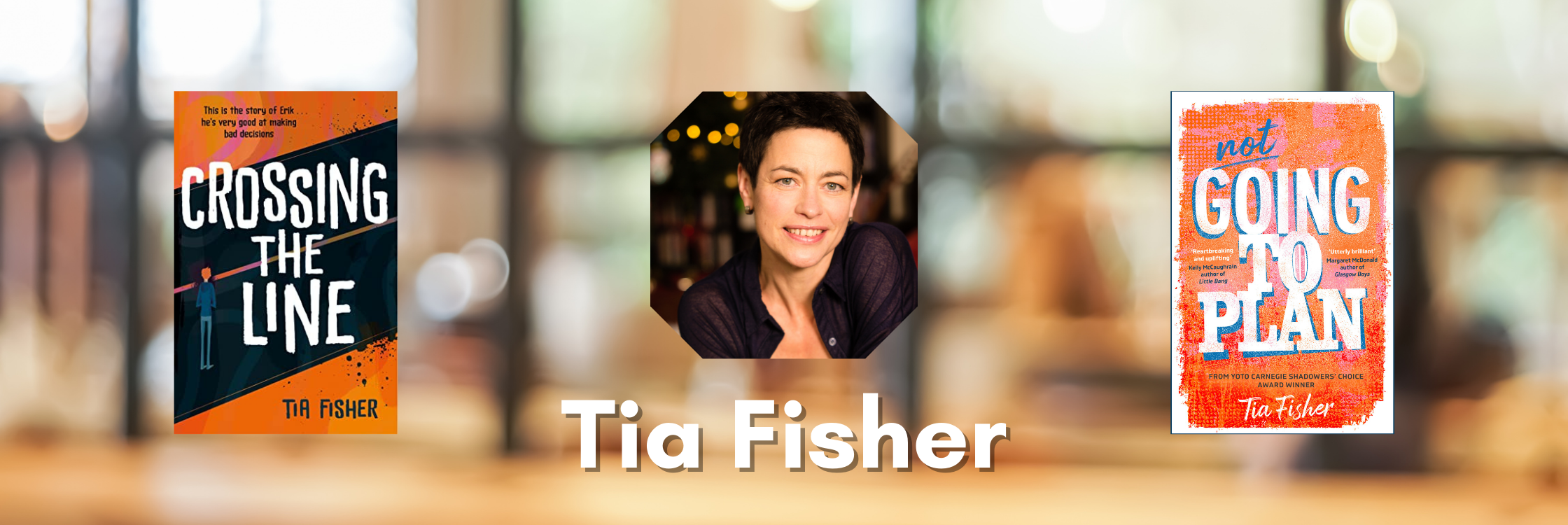
In the lead up to Camp YA we’re chatting to some wonderful authors about their books, life and Camp spirit! To celebrate the release of her brand new book, we’re heading back to school to chat to Yoto Carnegie Shadowers’ Choice Award Winner Tia Fisher about her stories Crossing the Line and Not Going to Plan. Both are powerful YA verse novels about making tough choices.
Verse novels are such sensorial experiences. How did you know this was the right way to explore Erik’s story in Crossing the Line?
I’ve been writing in narrative verse since I read Sarah Crossan’s ‘The Weight of Water’ in 2016. I wanted Crossing the Line to appeal both to teenagers who already love reading and those who haven’t discovered it yet. To grab and keep the attention of my target readers, Erik’s story had to be as accessible, impactful and immersive as possible. The storyline and Erik’s situation could have been enough by themselves, but verse would add the sensory and emotional punch that with so few words . . . well, it was the obvious choice. I realise now I’m a little on the ADHD side, and in my case that involves a heightened awareness of smell and sound – I think that might translate into my writing?
What was the process of writing and editing like, we know this story was inspired by true events but was it linear? Do the themes of the words or the characters come first?
Because it was based on a friend’s story, I knew the theme from the start. Talking to the real ‘Erik’ gave me the opening: he was looking back, trying to discover how he got into drug-dealing, where it all started. As I knew my character and themes, you could say the words come last, but actually, it’s an iterative process. The word-flesh layers itself on the bones of plot and people, and as you write and redraft, everything is crafted over and over again. You change elements of plot and deepen the nuance of character until it feels as though everything is a whole and couldn’t be any other way.
You even explore language and use multiple languages within the narrative, why was this important to do?
I do that in my new verse novel (Not Going to Plan) too, but no-one else’s ever remarked on it before. Until recently I lived in south-east London, in a babel of languages and cultures. For me, a contemporary school setting would feel inauthentic if it isn’t not polyglot. It’s a me thing too: I love languages, the feel of the sounds in my mouth, their rhythms in my ear. I only have a smattering of French, German and Portuguese, and I mix them into conversation for the joy of it. My family find it very annoying!
Did you always have the specifics of the formatting in mind and did it change throughout the process?
The formatting evolved as the book progressed: at the start I had no idea that I would end up painting word-pictures in Crossing the Line. I started by isolating some parts of text to draw attention to them or create a pause – sort of an exaggerated stanza or line break – then began indenting continued phases, then representing ideas within the poems by word shapes. No-one stopped me so I carried on! But in the more serious parts of the book, the playfulness of formatting felt less appropriate, and I used it judiciously.
Formatting makes the books even more accessible to those readers who don’t get on with ‘big black blocks of text’ as the American verse novelist Jason Reynolds put it. I can put the idea over not only in through the semantics of the words (which needs decoding), but in a more immediate visual language too. Great for some types of neuro-diversity. I had such great feedback from my young readers, I’ve developed the visual layouts even further in Not Going to Plan.
With each word being so intentional, were there elements you had to leave out that you wanted to explore?
Actually, no – or at least not because this was in verse. I suspect I trained myself when writing the previous two (unpublished) verse novels not to think in ‘fuller’ terms. Writers always have to trim and cut the excess verbiage in any case – this was just doing it more!
How do you create that balance of having a conversation with the reader, but also continuing the narrative?
When we tell stories, we check in with the audience occasionally, don’t we, to make sure they’re listening, add a reference or get input? As I wrote, I was so aware all the time that Erik was telling someone what happened to him that the ‘break-out’ points felt really natural. They happened where they happened, without very much thought on my part.
One of the continuing themes is the burden of youth that we don’t often acknowledge, why was it important to keep bringing the narrative around to this?
It’s bloody hard work, being a teenager. I was such a troubled teen, and in today’s world, which is so much harder, I honestly doubt I would have survived. I had a lot of issues that I can give a name to now, but no-one knew what was going on in the 80’s: it felt like I was the only person going through what I was experiencing. I certainly didn’t recognise myself in books – although I read voraciously – and it would have helped a lot.
I can’t do directly anything about making mistakes, being in poverty or county lines or getting pregnant or finding an identity, but I can write about them, to tell young people they are seen, they are not alone.
You talk about how you’ve moved around a lot and place is really important here. How has your experience shaped the intimacy of the place here and, how did you go about choosing and developing location?
Crossing the Line is set very loosely in the place where the real story actually happened, a city I know well. But it’s a version of that city I created for myself: not wholly accurate. I wanted it to be universal so that, for example, any reader could recognise ‘The Flo’ as a playpark near them. Narrative verse is so good for that – because descriptions are sparse, readers use their lived experience to paint the details in. What I picture when I read about the trap house in Crossing the Line, or the spit-ball spattered atrium of the school in Not Going to Plan will be very different to how you see it. There are as many versions of the locations in my books as there are readers.
When you have a story that deals with a lot of heavy subjects, especially ones based on real life experiences, how do you decide how much and of what aspects you give and what you retain?
I try only to include what is relevant to the story and to the reader: I have to keep checking in with my teen reader’s world and viewpoint and write it from their angle. That will mean excluding a lot, and twisting some. I hugely admire authors of picture books who are able to do the same for a four-year-old. They are hugely skilled.
What was your experience like working with The Children’s Society?
It’s a massive responsibility, writing issue-based books. You’ve got to get it right. I’m really grateful to The Children’s Society: they gave me background information which the real Erik couldn’t have known and verified that his was a typical story of grooming and entrapment. It’s very reassuring that they’re happy for Crossing the Line to be used in young people’s settings as a PSHE aid. And I’m also very grateful to the sexual health and wellbeing charity, Brook, who had the same kind of input on Not Going to Plan, because it needed to be bang-on accurate with the medical details. Both those charities do such great work with young people.
What was your experience of the whole process from being Carnegie nominated to then being Shadower’s choice?
I think I cried buckets at every stage! So many pinch-me moments in this writer’s dream: getting an agent . . . a publishing deal . . . what, me, a Carnegie nomination? Wow! Just being nominated was the most I could ever have dreamed of, so as I cleared each hurdle it became more and more unreal. Then, those precious seconds when my name was read out in the ceremony when I whooped in shock and forgot my prepared speech so I had to make it up! It was the most exciting experience of my life, honestly. 30,000 children, and they chose Crossing the Line? I won the best medal in the world.
Less egotistically, the other moment which will always stick in my mind was when I phoned the real Erik to tell him I was on the shortlist. We did it! Just getting on that shortlist meant that other children could have the warning he didn’t get.
Creating tension with such situations often provokes uncomfortability and makes readers consider bigger issues and questions. What have the readers’ responses been to the novel since its release?
I was worried I might be called out, that some children might feel it didn’t reflect their experience. After all, we’re all unique – I can’t write everyone’s story. But that hasn’t been the case. During the Carnegie, I got to read 84,000 words of Shadowers’ reviews and many told me that they learned a lot about county lines, and about how small decisions can snowball. They had a lot of empathy with his situation. And a couple of months ago, I was visiting a school and a girl told me this is what had happened to her brother, who had sadly died. Crossing the Line gave her a way to talk about what had happened in her family to the school.
How has your relationship with the book changed via these experiences?
I’m so proud of it, but perhaps in the same way I am of my now-grown children. I shaped them as best I could, but now they’re out in the world doing their own thing, and I’m amazed that such a messer-up-of-things as I am could even have had a part in their creation.
Crossing the Line is being adapted for the stage. What has that process been like and what are you most looking forward to audiences seeing?
It’s still in process! I adapted a section of it with a brilliant producer and director from St George’s Theatre in Great Yarmouth, where there is a big problem with county lines. It’s a new skill for me – so different from writing the book – but seeing the characters come alive on stage was magical. We shared it as part of the Norwich and Norwich festival and got the most amazing response from the local audience. We’re currently applying for funding to make a full-length adaptation to tour local theatres and run workshops in schools. What I loved best was the creativity forced by a small budget: three actors multi-rolled; they mimed; we used projection and sound effects to create setting and convey information. It was brilliant!
Not Going to Plan by Tia Fisher is out today, published by Hot Key Books in the UK.
Thank you to Tia Fisher for answering our questions!


